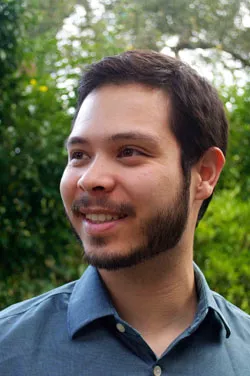Q&A with Tech Entrepreneur Nick Lum '04

Nick Lum '04
After a seven-year career as an attorney, Nick Lum '04 has just launched himself into the world of technological entrepreneurship with his new product, BeeLine Reader, a browser extension that aims to make reading easier and more efficient. BeeLine’s main feature is the gradient colors it adds to every line of text, which can be customized into bright or dark, blues or gray. The colors help the reader stay on the correct line and make quick transitions between lines. Read a review in Fast Company.
After graduating from Swarthmore with a major in economics and minor in linguistics, Lum attended the UCLA School of Law, where he studied the intersections of law and technology.
During his law career, Lum collaborated on BeeLine with a group of fellow inventors, including his second cousin (and Haverford alumnus) Andrew Cantino. The product recently won first place and $15,000 in Stanford’s social entrepreneurship contest, the BASES Social E-Challenge, a boon which will allow the group to work on marketing, software development, and user interface and experience improvement. Lum is now working at Oracle, a software engineering company, and continuing to perfect his product.
Below, Lum discusses his Swarthmore influences and the future of BeeLine.
Q: How did your Swarthmore education influence your future career (and entrepreneurship) path?
A: It encouraged me to study lots of different things—I took several classes in each of computer science (CS), linguistics, and economics. Each of these areas ended up being relevant to my day job and my after-hours entrepreneurship. After Swarthmore, I went straight to law school, and linguistics provided an excellent analytical framework. I would highly recommend classes in syntax, semantics (Professor of Linguistics Ted Fernald) and logic (Charles and Harriett Cox McDowell Professor of Philosophy Richard Eldridge) to aspiring lawyers.
Although not all entrepreneurs are software developers, it definitely helps to have some understanding of algorithms and programming techniques. I've been able to communicate much more efficiently with my developers on account of the several CS classes I took at Swarthmore. Economics is also really useful for entrepreneurs. Creating a startup involves thinking strategically about your market, your competitors, and your customers. Introduction to economics is key, and game theory (Professor of Economics Amanda Bayer) is a fun way to learn about strategic thinking.
Not surprisingly, my thinking about BeeLine was influenced by an introductory cognitive science class (Associate Professor of Lingustics K. David Harrison) that I took.
Q: In your own experience, when would a product like BeeLine have come in handy for you?
A: BeeLine would have been great when I was in high school, college, and law school. For me, it makes reading faster and also helps me read for long stretches without getting as tired or losing interest/motivation. I find that the color gradients keep my eyes moving across the page.
Q: Are there any aspects of BeeLine you hope to further investigate and/or improve upon?
A: Of course! We want to figure out what colors are the most commonly preferred, and we want to figure out the best way to determine the ideal color scheme for an individual. This decision may be based in part on age, for example, since this affects color perception. We also want to come up with an excellent user interface, which is both minimalist (so as not to bother existing users) but also sufficiently detailed (in order to educate new users).
Q: Why do you think BeeLine is a relevant product right now?
A: BeeLine is relevant now because of the shift to mobile. As screens get smaller, text gets smaller and more squished together. BeeLine's beneficial effects are amplified on small screens, especially when read in motion (like on a subway or bus). See our subway demo to find out why.
Q: How do you balance or integrate your job as a lawyer and your passion for BeeLine and technology?
A: Being a lawyer in Silicon Valley has taught me a lot about business and technology companies. That definitely helped when it came time to launch BeeLine. And being plugged into the tech scene helped me bring in clients to the law firm and establish myself as a high-tech lawyer. On a practical note, my legal job has allowed me to self-fund BeeLine instead of seeking outside funding.
Q: What are your ultimate goals as an entrepreneur and for this product?
A: I think everyone should be forced to read everything in color at all times. Just kidding! I hope that someday it will be possible to read most content using BeeLine. As the psycholinguist Stanislaus Dehaene notes in his book Reading in the Brain, our visual processing system did not evolve to be good at decoding written language; our writing systems have evolved to be efficient in light of the strengths and weaknesses of our visual processing system. Color gradients could be one further evolutionary step to make written language a more efficient means for transmitting knowledge.
At the very least, BeeLine will become a powerful tool in the accessibility community. We have heard from many readers with dyslexia and vision difficulties that it allows them to read in a way that they have never read before.



